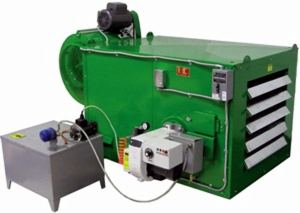|
Waste Oil Furnaces, The Pros and Cons of Used Oil FurnacesWaste oil furnaces are gaining in popularity, and it is easy to see why. If you have an auto repair shop, farm or other business that generates large quantities of used petroleum products from engines or equipment, a waste oil heater can be a source of free heat. Burning your own waste makes sense from several different angles. First, you have to dispose of it somehow, either by having it hauled off or burned. Even if you are selling it to a recycler, they are not paying you anywhere near what it could be worth to you as a fuel. If you compare the heat output of a gallon of used petroleum to what it would cost to create the same amount of heat from natural gas (the most economical heating fuel out there), the used petroleum is worth well over a dollar a gallon. If you are replacing an electric or propane heater with a used oil furnace, it is worth way more than that!
Using your own waste as a heating fuel is very environmentally friendly. A waste oil burner that is operating correctly emits no more pollution than a standard fuel oil furnace. There is no odor or visible smoke. By burning your waste on site, you are eliminating transport emissions from having it hauled away, and also the possibility of accidental or intentional dumping.
These systems have a few disadvantages to be aware of, though. The first disadvantage is the initial cost. New, brand name waste oil heaters start at about $4000 and go up from there, and that doesn't include the storage tank, installation, or chimney components, either. There is at least one model that is less expensive Another disadvantage is the amount of maintenance and attention that is required. Most of these furnaces will need to be cleaned on a regular basis, as often as once a month or so. Water/antifreeze has to be drained from the tank on a weekly basis. Many require an annual "tune up", including the replacement of several parts. The fuel needs to be strained. Many of the less expensive waste oil burners require manual adjustments to be made when they are operating. Every used oil heater produces a small amount of ash that must be disposed of. They all require compressed air to operate. Some used oil furnaces come with built-in compressors that allow you to turn off your big shop compressor at night and on weekends and still keep the building warm. In spite of the disadvantages, the lure of free fuel can be really hard to pass up! A waste oil furnace can be a good choice even if you don’t generate a lot of the "fuel" yourself. Some garages will give it to you for free if you haul it away. You could become a convenient drop off point for family, friends and neighbors to get rid of theirs. Some models will burn almost anything - engine lubricant, transmission fluid, gear lube, hydraulic fluid, even used cooking grease. Others are a little more finicky, and will only burn a specific weight range of petroleum products. Most models will also burn regular diesel fuel if your free supply runs out. If you are willing to take care of the maintenance, have a supply of free fuel, and are heating a large enough garage on a full time basis, a used oil furnace can pay for itself in a matter of one to two years. From that point on, waste oil furnaces provide free heat, eliminate your environmental liability in the event of an accident, and reduce any concerns about rising fuel or electricity costs. If you are a little bit adventurous, you can even build your own waste oil heater. Check out our page on waste oil heater plans. Otherwise, before deciding on a particular model, I recommend getting a copy of the owner's manual and reading it before you buy. That way you will know exactly what the maintenance requirements are and what types of fuel a particular waste oil furnace will burn before you make the purchase. For more information on other types of heaters, go to our Related Pages menu on the right near the top of this page.
|

Related Pages
on this site:
Garage Heating
Electric
Natural Gas
Propane - Convection
Propane - Radiant
Portable Propane
Ventless Propane
Radiant Tube
Wood Burning
Oil Filled
Waste Oil Furnaces
Waste Oil Heater Plans
Radiant Floor Heating System
Electric Radiant Floor Heat
Hydronic Radiant Floor Heat





